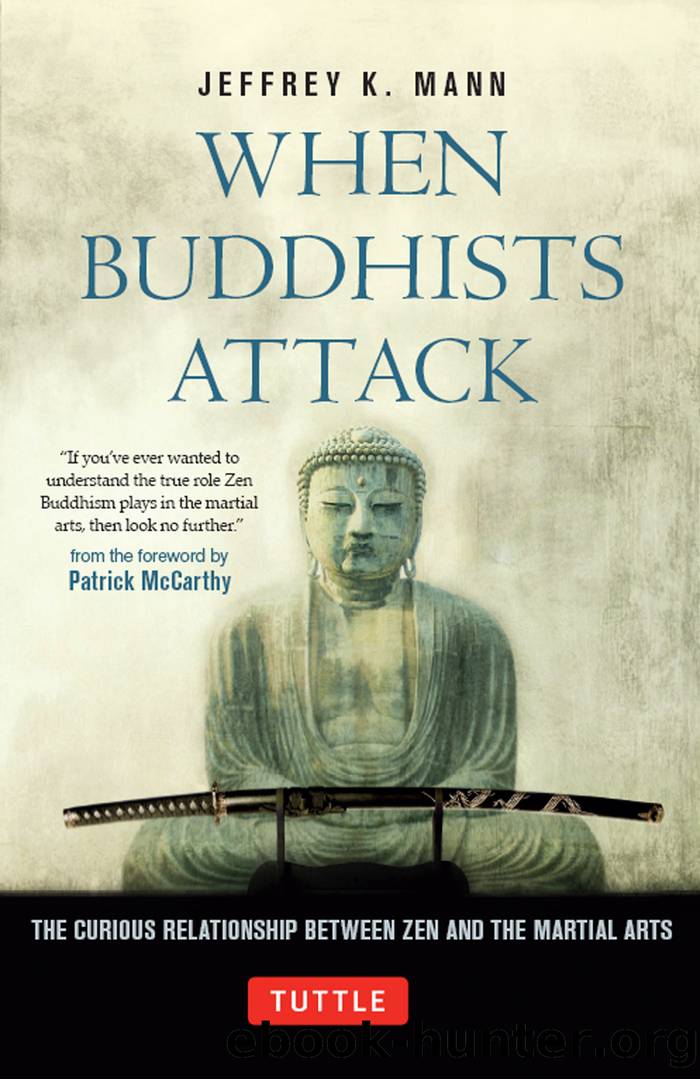When Buddhists Attack by Jeffrey K. Mann

Author:Jeffrey K. Mann
Language: eng
Format: epub
ISBN: 978-1-4629-1048-9
Publisher: Tuttle Publishing
Footnotes
* As in Deshimaru, 54.
† Yūhō Yokoi, Zen Master Dōgen: An Introduction with Selected Writings (New York: Weatherhill, 1976), 46.
* Philip Kapleau, The Three Pillars of Zen: Teaching, Practice, and Enlightenment (New York: Doubleday, 1980), 21f.
† Shunryu Suzuki, Zen, 26.
‡ Deshimaru, 69.
* As in Leggett, Zen and the Ways, 45. To this we may add Omori Sogen’s observation, “While it may seem easier to unite your spirit with your eyes closed, that would become detached zazen and not living zazen.” An Introduction to Zen Training, 39.
* The Japanese word hara refers to the abdomen or belly in general. It is common word, such that a child might complain that her hara hurts, or a boxing fan might yell at the TV for his favorite pugilist to hit the other in the hara. Tanden refers to the more precise point, discussed above, where it is believed that ki may be focused.
† Interview with Hirokazu Kanazawa, http://www.youtube.com/watch?v=iKDdXBOJDBo. It may be important to note that Kanazawa’s mention of “ki” should not bring to mind some superhuman energy that allows one to perform superhuman feats. Rather, it is a kind of cultural shorthand for the various energies that quicken the body.
* Sogen, An Introduction to Zen Training, 58.
† Kapleau, 16.
‡ Ibid.
* As in Cleary, 187.
† As in Stevens, 41. Likewise, Yagyu Munenori advises, “The mind should be thoroughly concentrated below the waist and the ch’I should not be driven too precipitously.” (76)
‡ An old poem cited approvingly by Takuan, 50.
* Omori Sogen, An Introduction to Zen Training, 46f.
† Ibid., 51.
* Shunryu Suzuki, 29.
† As in Hosokawa Dogen, Omori Sogen: The Art of a Zen Master (New York: Kegan Paul International, 1999), 121.
* Shunryu Suzuki, 32.
† Ibid., 128.
‡ Ibid., 73.
* From the 2nd century C.E. poet, Aśvaghosa, as in Strong, 134.
† Shunryu Suzuki, 73.
‡ Omori Sogen Zen Training, 74.
* Ibid., 17.
† As in Kapleau, 49.
* Shunryu Suzuki, 88.
† Ibid., 58.
* As in Cleary, 178f.
† D. T. Suzuki, Zen and Japanese Culture, 146.
‡ Ibid., 204.
§ Ibid., 189.
* As in Kapleau, 57.
* Joe Hyams, Zen in the Martial Arts (New York: Jeremy P. Tarcher/Putnam, 1979), 97.
† As in D. T. Suzuki, Zen and Japanese Culture, 415.
‡ Omori Sogen, Zen Training, 119. To this we may add the advice of Shunryu Suzuki, “When you try to attain something, your mind starts to wander about somewhere else. When you do not try to attain anything, you have your own body and mind right here.” (26f.) “But as long as you think you are practicing zazen for the sake of something, that is not true practice.” (47) “Just remain on your cushion without expecting anything.” (49)
* Hosokawa Dogen, 116.
* James H. Austin, Zen and the Brain (Cambridge, The MIT Press, 1998), 85.
† Ibid., 88.
‡ Omori Sogen, Zen Training, 130.
§ Austin, 86.
* Ibid., 105.
† As in D. T. Suzuki, The Zen Doctrine of No-Mind: The Significance of the Sūtra of Hui-neng (Boston: Weisner Books, 1969), 110.
Download
This site does not store any files on its server. We only index and link to content provided by other sites. Please contact the content providers to delete copyright contents if any and email us, we'll remove relevant links or contents immediately.
The Way of Zen by Alan W. Watts(6604)
Ego Is the Enemy by Ryan Holiday(5417)
The Art of Happiness by The Dalai Lama(4125)
The Book of Joy by Dalai Lama(3976)
Why Buddhism is True by Robert Wright(3447)
Spark Joy by Marie Kondo(3299)
Shift into Freedom by Loch Kelly(3194)
Happiness by Matthieu Ricard(3040)
A Monk's Guide to a Clean House and Mind by Shoukei Matsumoto(2912)
The Lost Art of Good Conversation by Sakyong Mipham(2651)
The Meaning of the Library by unknow(2565)
The Unfettered Mind: Writings from a Zen Master to a Master Swordsman by Takuan Soho(2309)
The Third Eye by T. Lobsang Rampa(2260)
Anthology by T J(2210)
Red Shambhala by Andrei Znamenski(2193)
The Diamond Cutter by Geshe Michael Roach(2059)
Thoughts Without A Thinker: Psychotherapy from a Buddhist Perspective by Epstein Mark(2014)
Twilight of Idols and Anti-Christ by Friedrich Nietzsche(1892)
Advice Not Given by Mark Epstein(1878)
